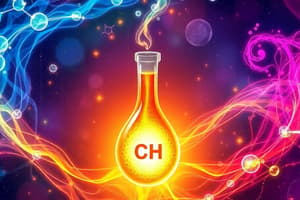Podcast
Questions and Answers
Which of the following is a pure substance that cannot be broken down into simpler substances using a chemical reaction?
Which of the following is a pure substance that cannot be broken down into simpler substances using a chemical reaction?
- Hydrogen
- Water
- Oxygen
- Gold (correct)
What is the fundamental building block of chemical elements?
What is the fundamental building block of chemical elements?
- Ion
- Atom (correct)
- Compound
- Molecule
How many groups are there in the periodic table?
How many groups are there in the periodic table?
- 12
- 18 (correct)
- 17
- 15
What is the outermost electrons in an atom that participate in chemical bonding called?
What is the outermost electrons in an atom that participate in chemical bonding called?
What type of substance is water (H2O)?
What type of substance is water (H2O)?
In which group are the alkali metals located in the periodic table?
In which group are the alkali metals located in the periodic table?
What type of bond occurs when atoms share electrons?
What type of bond occurs when atoms share electrons?
How do elements change as you move from left to right across a period in the periodic table?
How do elements change as you move from left to right across a period in the periodic table?
What is the first non-metal element found in the periodic table?
What is the first non-metal element found in the periodic table?
What term describes the arrangement of electrons in an atom?
What term describes the arrangement of electrons in an atom?
Flashcards are hidden until you start studying
Study Notes
Introduction
Chemistry is a branch of natural sciences that studies the composition, properties, structure, and behavior of matter. At the heart of all matter is the atom, which is the fundamental building block of chemical elements. Chemistry helps us understand the physical and chemical processes that make up the world around us, and it also provides a foundation for the development of new technologies and industries. In this article, we will explore the basics of chemistry, the periodic table, and some key concepts in the field.
Understanding Matter
There are two types of matter: elements and compounds. Elements are pure substances that cannot be broken down into simpler substances using a chemical reaction. Examples of elements include hydrogen, oxygen, carbon, and gold. Compounds, on the other hand, are pure substances made up of one or more elements in a specific arrangement. Water (H2O) is an example of a compound, as it is made up of hydrogen and oxygen.
The Periodic Table
The periodic table is a tool used by chemists to organize and classify the chemical elements based on their physical and chemical properties. There are 118 known elements, and the periodic table helps chemists understand how these elements interact with each other. The table is organized into rows and columns, with rows called periods and columns called groups.
Groups
The groups in the periodic table are divided into 18 groups, with groups 1-17 containing elements of the same group. Groups are also referred to as families, and they are named based on the elements in that group. For example, the alkali metals are in group 1, the halogens are in group 17, and the noble gases are in groups 18.
Periods
The periods in the periodic table are the rows, and there are 18 periods. As you move from left to right across a period, the elements become smaller and lighter, while their atomic number increases. In the first two periods, all the elements are metals, while the third period has the first non-metal. The fourth period has the first noble gas and is the last period to contain all the elements in the same group.
Key Concepts in Chemistry
Some key concepts in chemistry include valence electrons, electron configurations, ionic and covalent bonds, and chemical reactions.
Valence Electrons
Valence electrons are the outermost electrons in an atom that participate in chemical bonding. These electrons are also called bonding electrons, and they are shared between two atoms to form a chemical bond.
Electron Configurations
Electron configurations describe the arrangement of electrons in an atom. The first electron goes into the 1s orbital, the second electron goes into the 2s orbital, and so on. The 1s orbital holds two electrons, the 2s orbital holds eight electrons, and the 2p orbital holds six electrons.
Ionic and Covalent Bonds
Ionic bonds are formed when an atom donates an electron to another atom, creating an ion and a neutral atom. The ions then attract each other due to opposite charges. Covalent bonds, on the other hand, occur when atoms share electrons.
Chemical Reactions
Chemical reactions occur when a chemical is converted into one or more different substances. This conversion can result in the formation of a new chemical compound or the breaking down of an existing compound.
Conclusion
Chemistry is a fascinating field that helps us understand the world around us. From the basics of matter to the intricacies of the periodic table, chemical reactions, and bonds, the study of chemistry provides valuable insights into the properties and behavior of matter. As we continue to explore the universe and the world around us, our understanding of chemistry will only grow stronger, enabling us to harness its potential for the betterment of humanity.
Studying That Suits You
Use AI to generate personalized quizzes and flashcards to suit your learning preferences.




